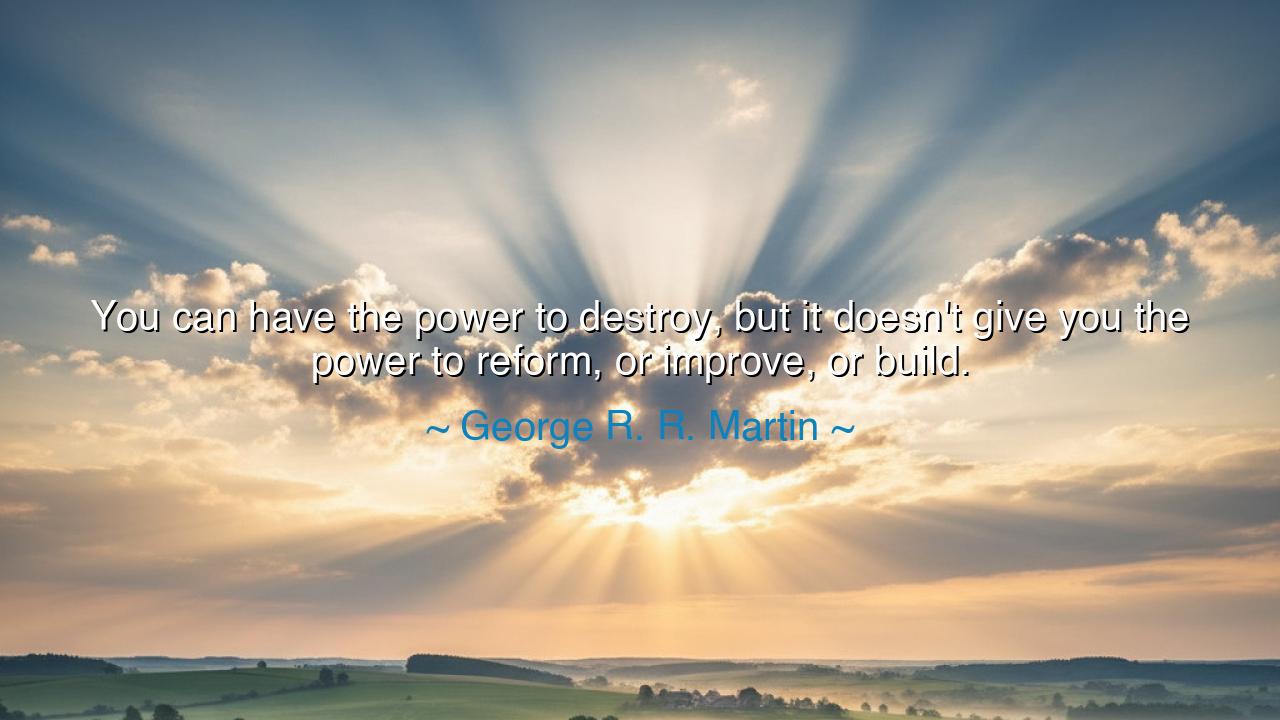
You can have the power to destroy, but it doesn't give you the
You can have the power to destroy, but it doesn't give you the power to reform, or improve, or build.






George R. R. Martin, teller of epic tales, unveils a truth as old as kingdoms: the power to destroy is not the same as the power to reform, to improve, or to build. To tear down is easy; even the weakest flame can consume a mighty forest. But to raise a new dwelling, to heal a nation, to mend the broken fabric of life—this requires a higher strength, the patience of vision, and the endurance of wisdom. Destruction is swift, but creation is eternal labor.
The ancients bore witness to this. When the Goths and Vandals swept upon Rome, their swords and torches laid low the empire’s glory in a single generation. Yet they did not raise another Rome; what they destroyed, they could not replace. The stones of the Colosseum crumbled, but no greater city arose in their wake. Thus history thunders the warning: the hand that shatters is not the hand that builds.
Contrast this with the work of Abraham Lincoln. He was given the power of armies, and he used them to break the chains of slavery and to end the rebellion that threatened the Union. Yet he knew that victory in war was not enough. His greater labor was to reform and rebuild, to bind wounds and guide the nation into peace. His words, “with malice toward none, with charity for all,” reveal the heart of one who sought not merely to destroy an enemy, but to plant a future. Here lies the nobler power: not the sword that cuts, but the hand that heals.
Martin’s words also remind us of the nature of human ambition. Many rulers, intoxicated by conquest, mistake their ability to ruin as proof of greatness. Yet what are they remembered for? Hitler burned cities, shattered nations, and brought death to millions. But in his destruction, he built nothing—his empire of ashes perished with him. By contrast, men who build, like Gandhi, who forged freedom through peace, leave behind a legacy that endures beyond fire and steel.
Let the generations remember: the power to destroy is common, for it is born of rage and recklessness. But the power to build, to reform, to improve, belongs only to the truly great, for it demands patience, vision, sacrifice, and love. Any fool can wield a torch; it takes a master craftsman to shape a temple. Therefore, honor not those who break, but those who raise; for the builders, not the destroyers, are the true lords of time.






UGUser Google
I find this perspective both sobering and enlightening. It challenges the assumption that power is inherently good or productive. I’m curious about how this applies to modern contexts like technology, politics, or business—where individuals can rapidly disrupt systems but may lack the skills or vision to rebuild effectively. Does this mean that true greatness lies not in domination but in the ability to cultivate, sustain, and improve, even when it demands more effort and patience?
HTvo hoang thanh
This quote provokes a proactive question: if the ability to destroy doesn’t translate into constructive capacity, how should societies structure systems of accountability? History seems full of examples where people with immense destructive power couldn’t achieve lasting improvements. I also wonder whether creativity, foresight, and empathy are the missing components that transform authority into positive impact. How can education or mentorship instill these qualities alongside traditional measures of power?
PNPhu Nguyen
I feel a mix of caution and insight reading this. It highlights that strength or authority alone isn’t enough to achieve meaningful progress. Is it possible that some people wield great power yet fail to understand the patience, vision, and collaboration required to build or improve? This also makes me question how we can cultivate leaders who not only prevent harm but also actively foster constructive outcomes for communities.
HKHoang Khiem
This makes me reflect on the difference between power and responsibility. Many people assume that having influence automatically equates to the ability to create positive change, but destruction is often easier than building. I wonder why society sometimes glorifies destructive figures while undervaluing those who take the slower, harder path of reform or creation. Could this perspective be a warning about leadership and the ethical use of power?